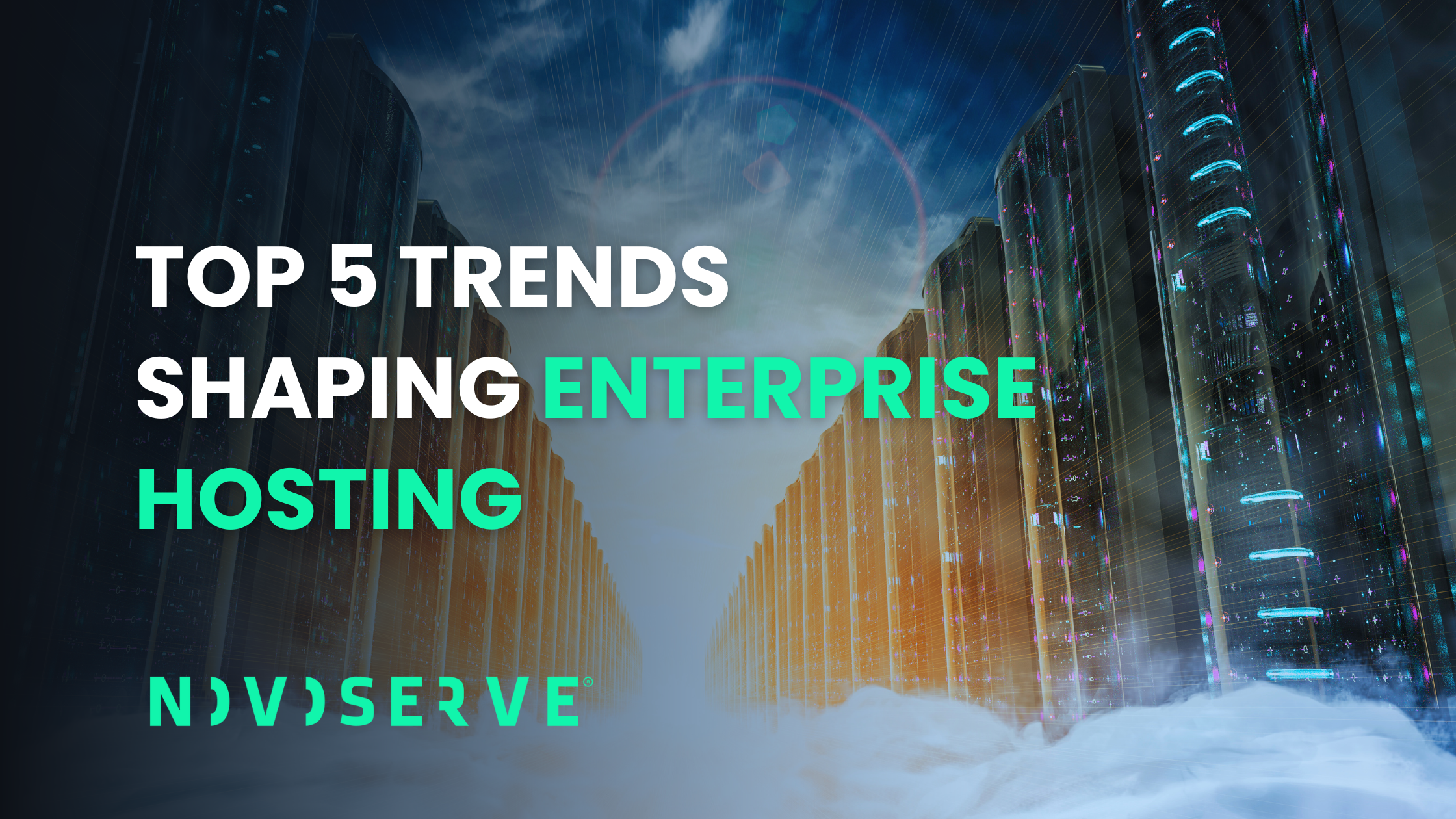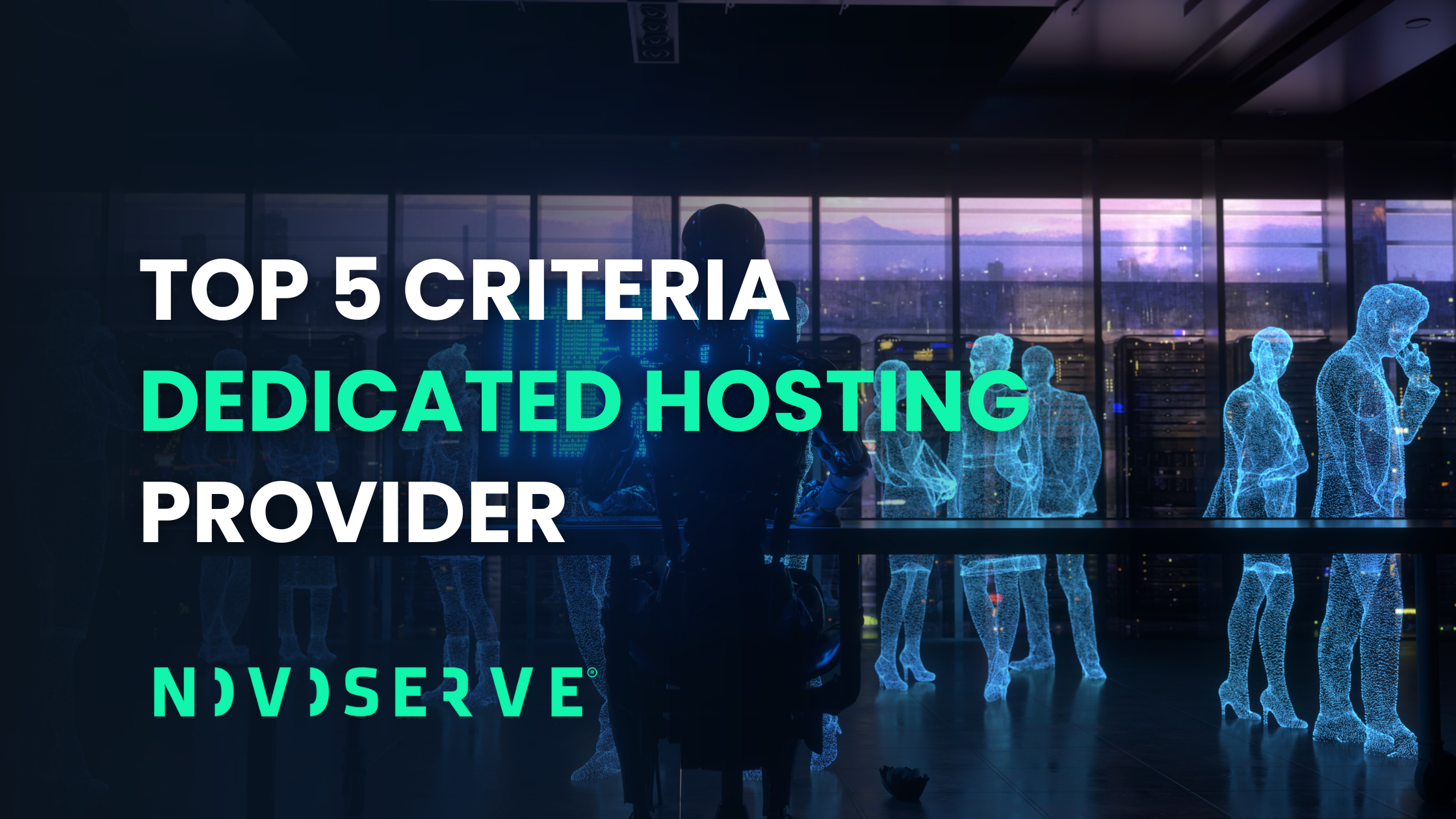Yesterday's hosting solutions are no longer adequate for the mission-critical, performance-intensive, and highly secure demands of today. This evolution marks a pivotal moment in the hosting industry trends, moving away from one-size-fits-all models toward specialized, high-performance solutions.
The foundation upon which your applications, data, and digital experiences are built has become the primary determinant of your success. At NovoServe, where we live and breathe high-performance infrastructure, we see these shifts firsthand. This article will explore the critical trends defining the future of enterprise hosting and explain why a robust physical foundation is more crucial than ever.
What is Enterprise Hosting?
What is Enterprise Hosting?
Before diving into the trends, it's essential to define what we mean by "enterprise hosting." Unlike standard shared hosting or basic VPS services, enterprise hosting is a comprehensive solution designed to meet the stringent demands of medium to large businesses and organizations with mission-critical online operations.
It's not just about providing server space; it's a holistic approach characterized by:
- Superior Performance: Utilizing dedicated, high-end hardware resources to ensure applications run without bottlenecks.
- Enhanced Security: Implementing multi-layered security protocols, from the physical data center to the network level, to protect sensitive data. This is crucial for services like secure enterprise email hosting, where confidentiality is paramount.
- High Availability: Guaranteeing near-perfect uptime through redundant power, cooling, and network connections, backed by robust Service Level Agreements (SLAs).
- Scalability: Providing the flexibility to scale resources up or down to match business growth and fluctuating demand.
- Expert Support: Offering 24/7 access to senior engineers who understand the complexities of enterprise-level infrastructure.
Whether it's for a high-traffic enterprise web hosting solution, a complex database, or a sophisticated enterprise cloud hosting environment, the core principle is the same: providing a no-compromise foundation for business-critical operations.
Hosting Industry Trends for the Modern Enterprise
Top 5 Trends for the Modern Enterprise Hosting
The ground is shifting beneath our feet. Enterprises that understand and adapt to these five interconnected trends will build a significant competitive advantage.
The Resurgence of Bare Metal: Performance and Predictability Reign Supreme
For years, the prevailing narrative was a wholesale migration to the public cloud. However, a powerful counter-trend has emerged: the strategic return to bare metal. Enterprises are rediscovering that for core, performance-sensitive workloads, the virtualization layer of the public cloud can be an inhibitor, introducing latency, performance unpredictability (the "noisy neighbor" effect), and, most critically, unpredictable costs.
The FinOps movement has put a spotlight on spiraling cloud bills, leading many organizations to repatriate workloads to a more predictable cost model. A bare metal server offers a fixed monthly cost, allowing for precise budgeting without sacrificing power. This is where the concept of a hybrid cloud becomes strategically brilliant for governmental and large-scale enterprises. They leverage bare metal for their stable, secure, and high-performance core applications—like databases and ERP systems—while using the public cloud for transient, burstable workloads like development and testing. This approach delivers the best of both worlds, but it all starts with a solid bare metal foundation.
The AI Revolution and the Inescapable Rise of the GPU
Artificial Intelligence is no longer a futuristic concept; it's a business-critical workload. From training large language models (LLMs) to running real-time inference engines, AI applications are incredibly resource-intensive. They require a specific type of processing power that traditional CPUs cannot efficiently provide: the massively parallel processing capabilities of GPUs (Graphics Processing Units).
This has created a surge in demand for dedicated servers equipped with high-end GPUs from manufacturers like NVIDIA. Attempting to run these workloads in a typical virtualized enterprise cloud hosting environment often leads to contention for GPU resources and suboptimal performance. To truly unlock the potential of AI, enterprises need direct, unimpeded access to the hardware. This is another area where bare metal shines, providing the dedicated, enterprise-grade hardware necessary to power the most demanding AI and machine learning tasks without compromise.
The Storage Revolution: NVMe SSDs Become the New Standard
For decades, SATA-based SSDs were the go-to for performance storage. Today, they are being rapidly superseded by NVMe (Non-Volatile Memory Express) SSDs, and this shift is one of the most significant hosting industry trends impacting application performance.
Think of it this way: if a SATA SSD is a multi-lane highway, an NVMe SSD is a dedicated, high-speed bullet train track directly connected to the CPU. By leveraging the PCIe bus, NVMe drives bypass older, slower data bus architectures, resulting in dramatically lower latency and exponentially higher throughput. For any I/O-intensive application—be it a large database, a real-time analytics platform, or a high-traffic enterprise web hosting environment—the move to NVMe is not just an upgrade; it's a transformation. It means faster page loads, quicker database queries, and a tangibly better end-user experience.
Data Sovereignty and the Decentralized, High-Performance Network
In an era of GDPR and increasing data privacy regulations, data sovereignty—the principle that data is subject to the laws of the country in which it is located—has become a C-level concern. Enterprises can no longer afford ambiguity about where their sensitive customer and corporate data resides. Storing data in a specific jurisdiction is a legal and ethical requirement.
This is a fundamental challenge for hyperscale public clouds, where data can be moved between regions. In contrast, a bare metal server from a provider like NovoServe gives you an absolute guarantee: your server and your data are physically located in a specific data center, in a specific country, under a specific legal jurisdiction.
This trend is also driving the need for a more decentralized infrastructure. To serve a global customer base effectively, enterprises need to be closer to their clients to reduce latency. This requires a provider with a geographically diverse footprint of data centers. However, having multiple locations is only half the battle. These locations must be interconnected by a truly global premium network. A powerful network with extensive peering partnerships ensures that traffic takes the shortest, fastest path to the end-user, regardless of their location. The network is the circulatory system of your entire enterprise hosting strategy.
The Unwavering Need for Scalability and Robustness
Digital growth is relentless. The infrastructure you choose today must be able to support your ambitions for tomorrow. This requires a robust storage architecture that can grow with your data and a bare metal hosting partner who makes scalability simple. Whether it's adding more storage, upgrading a CPU, or deploying additional servers in new locations, the process should be seamless and fast. Your enterprise hosting solution must be an enabler of growth, not a bottleneck.

The emerging hosting industry trends all point to a specialized, performant, and physically grounded enterprise infrastructure. While the public cloud remains a useful tool, the core of any serious digital operation now demands the power, security, and predictability that only a bare metal foundation can provide.
Don't build your future on a compromised foundation. Contact us today to discuss how NovoServe can power your enterprise hosting strategy.




